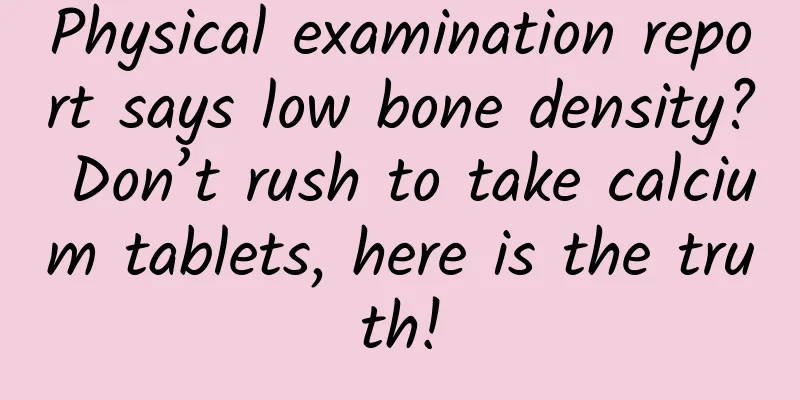Physical examination report says low bone density? Don’t rush to take calcium tablets, here is the truth!

|
When low bone density is found during a physical examination, many people's first reaction is to "quickly supplement calcium." However, is this approach really scientific? Today, let's talk about the truth behind low bone density and how to deal with it scientifically. 1. Low bone density ≠ calcium deficiency Bone density is an important indicator of bone mineral content, but it is not completely equivalent to calcium deficiency. Bone health depends not only on the calcium content, but also on factors such as bone structure, the quality of bone collagen, and the balance of bone metabolism. In fact, low bone density may be caused by a variety of reasons, such as insufficient vitamin D, lack of exercise, long-term use of certain medications, and even some chronic diseases. 2. Risks of blindly supplementing calcium Many people think that as long as they take more calcium, their bone density will naturally increase. However, studies have shown that the effect of calcium supplementation alone is actually very limited. What's worse, excessive calcium supplementation may cause a series of health problems, such as kidney stones and vascular calcification. Especially for the elderly, the daily calcium intake is recommended to be controlled at 1000-1200 mg. Exceeding this range may increase the risk of cardiovascular disease. 3. How to deal with low bone density scientifically? (1) Dietary adjustment High-calcium diet : Eat more calcium-rich foods such as dairy products, beans, nuts, and dark green vegetables. Supplement vitamin D : Vitamin D can significantly enhance calcium absorption, which can be supplemented by sun exposure (at least 20 minutes a day) or eating foods rich in vitamin D (such as milk, egg yolks, fish, etc.). Balanced diet : Keep a varied diet and avoid high-salt, high-fat diets, as high salt can accelerate calcium loss. (2) Exercise intervention Weight-bearing exercises : such as walking, jogging, dancing, etc. These exercises allow the body to bear its own weight, stimulate bone growth, and help increase bone density. Muscle strengthening exercises : Using elastic bands, dumbbells, etc. for strength training can increase muscle strength and reduce the burden on bones. Balance and flexibility training : Exercises such as yoga and Tai Chi can help improve body coordination and balance, and reduce the risk of falling. (3) Regular check-ups and professional guidance <br /> If your bone density is low, it is recommended that you go to a regular hospital for a check-up to rule out the influence of other diseases. Under the guidance of a doctor, choose appropriate supplements or medications according to your specific situation. 4. Conclusion Low bone density does not mean that you have to take calcium supplements like crazy. Blind calcium supplementation not only has limited effect, but may also bring health risks. Scientific diet, reasonable exercise and regular health checks are the right way to maintain bone health. So, when you see "low bone density" on the physical examination report, don't panic, start with your lifestyle to make your bones healthier! |
<<: What is play therapy? Can it really cure illness?
Recommend
The efficacy and function of mountain mulberry leaves
Yamleaf is a very common Chinese medicine and als...
The efficacy and function of marsh water horse teeth
In daily life, people are not only very familiar ...
Effects and clinical applications of Radix Glehniae
Traditional Chinese medicine has great advantages...
What are the effects and functions of Platycladus orientalis
Nowadays, many friends often suffer from hair los...
National Malaria Day | How much do you know about infectious diseases that claim the lives of millions of people every year?
April 26, 2024 is the 17th "National Malaria...
What are the effects of drinking wolfberry and red dates soaked in water?
Both wolfberry and red dates are common in our li...
How many days does it take to get menstruation after taking Motherwort Granules?
Most people must be familiar with Motherwort Gran...
The efficacy and function of Castanea
The world is full of wonders, and Chinese medicin...
The efficacy and role of urination (worms)
The Chinese medicine Sheniao (Chongling) is a rel...
What is the medicinal value of Ginkgo?
Everyone should be familiar with ginkgo, which is...
Salamander or giant salamander? There are some legends you don’t know about the prototype of mermaids
Thanks to literary and artistic works, the image ...
HPV vaccination is free in many places! When and how to get it?
recently Wuxi, Jiangsu Province, began to conduct...
The efficacy and function of Dayangguan
Do you know Da Yangguan? It is a common Chinese m...
With this magical coating, A4 paper can also be used to hold milk tea
Classic origami cranes made of paper, coated with...









